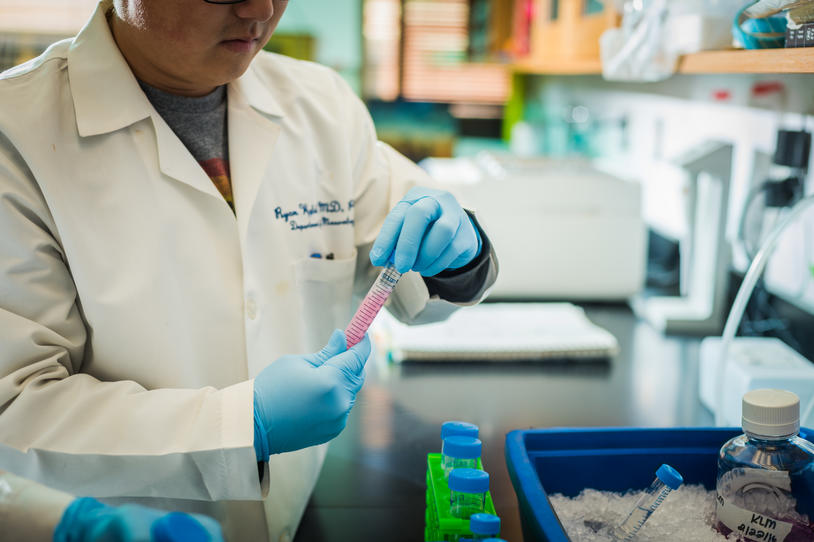
The Michael J. Fox Foundation (MJFF) announces 76 grants that total more than $74.1 million awarded in August and September 2023. These projects aim to support development of symptomatic and disease-modifying treatments, expand genetic understanding and identify new biomarkers for Parkinson’s disease (PD).
Here we review some projects expanding our understanding of PD, diagnostic tools and potential therapies. See full list of MJFF funded studies.
Targeting Mitochondria to Improve PD Treatment
Mitochondria are tiny powerhouses in cells that malfunction in Parkinson’s. When this malfunction happens, mitochondria stop clearing alpha-synuclein accumulations from the brain and dopamine degeneration develops, resulting in PD’s motor and nonmotor symptoms. Based on this disease process, researchers are targeting mitochondria as a therapeutic approach to slow or stop the progression of Parkinson’s.
Increasing Parkin activity: Researchers have found that the Parkin proteins regulate the turnover of mitochondria and linked reduced Parkin activity to mitochondrial dysfunction. Now, investigators at Nine Square Therapeutics, led by Tina Schwabe, PhD, are developing a small-molecule drug candidate designed to increase Parkin activation and mitochondrial health, and in turn protect dopamine neurons. This nonclinical research was selected for funding through the Parkinson’s Disease Therapeutics Pipeline Program.
Stabilizing cardiolipin: Cardiolipin, a part of the membrane of mitochondria, is known to play a central role in mitochondrial functioning. Investigators at Stealth BioTherapeutics, led by Hatim Zariwala, PhD, are studying whether an investigational cardiolipin-targeting small-molecule agent slows PD progression. With funding from the Spring 2023 RFP: Accelerating Biological Understanding and Therapeutic Translation for Parkinson’s Disease, they plan to treat neuronal stem cells from humans and an animal model for PD with an agent, called SBT-272, then examine the effects on symptoms, mitochondrial functioning and dopamine neurons.
Launching a Phase I Trial of a Novel Drug
In another approach targeting the dopamine degeneration that occurs in PD, researchers are focusing on a protein called Nurr1. Studies have shown Nurr1 proteins protect dopamine-producing nerve cells by suppressing inflammation, and their malfunctioning may contribute to PD. With funding from MJFF, investigators at NurrOn Pharmaceuticals, Inc., are conducting a Phase I trial of ATH-399A, an oral drug designed to activate Nurr1 and, in turn, boost the activity of dopamine cells and slow progression of PD. The trial will test whether ATH-399A is safe and well tolerated in healthy volunteers and explore the effects of increasing its dosage.
Reducing Gait Impairments with Deep Brain Stimulation
Shuffling steps, difficulty turning and other gait impairments are common and disabling symptoms of PD. Grégoire Courtine, PhD, and his lab at Ecole Polytechnique Fédérale de Lausanne are conducting studies on a genetically-modified small model that develops gait impairments similar to those occurring in people with PD. They aim to identify the part of the brain that is overly active before walking problems appear and then stimulate that area to delay the onset of these walking problems and make them less severe. If successful, stimulating the same brain parts in people with PD may similarly improve their symptoms. This work is funded by the Spring 2023 RFA: Circuits & Cellular Targets for PD’s Symptoms.
Expanding Understanding of LRRK2’s Role in PD
Mutations in the LRRK2 gene are some of the most common mutations linked to PD. Research largely has focused on a LRRK2 mutation occurring in white people (G2019S), while two LRRK2 mutations occurring in Asians (G2385R and R1628P) have received little attention. Ai-Huey Tan, MD, PhD, and her team at University of Malaya have collected clinical data and biosamples from Malaysian patients who carry these two mutations and have been diagnosed with PD. Now they plan to use the funding from the Accelerating Biological Understanding and Therapeutic Translation program to explore how these mutations affect cellular functions and bodily functions and identify biomarkers associated with G2385R and R1628P.
Improving Understanding of Parkinson’s Biology
Biomarkers for PD provide objective insights into the biology of the disease. These insights help researchers better understand how PD affects the body and improve clinical trials, increasing the chances for better drugs people at all stages of the disease.
Measuring disease activity and progression: Investigators at Octave Bioscience, led by James Eubanks, PhD, have developed and validated a blood-based test to monitor a range of biomarkers for multiple sclerosis disease activity. Now, with funding from MJFF, they are working to build a similar tool for PD. The tool, which will check for various biological indicators of the Parkinson’s, potentially could be used to support earlier diagnosis and assess how drug treatment affects disease progression.
Exploring the role of gut inflammation in PD: Research indicates that gut inflammation plays a role in certain subtypes of PD. Inga Peter, PhD, and her team at Icahn School of Medicine at Mount Sinai received a research grant to investigate gut inflammation and bacterial diversity in people with PD patients. They also plan to examine brains among people with PD and people with inflammatory bowel disease to identify potentially overlapping genetic mutations and biological processes. Findings could support the development of novel drug targets aimed at reducing inflammation or the repurposing of existing therapies used to treat other immune diseases.
The Michael J. Fox Foundation continues to fund advances in technology and medicine to drive toward effective therapies that can prevent, slow or stop disease progression.
You can be a part of that mission.
The Parkinson’s Progression Markers Initiative (PPMI) is our landmark study on a mission to stop the disease. It is open to anyone over age 18 in the United States. Whether you have Parkinson’s or not, join the study that could change everything.
Recently diagnosed with PD or live outside the U.S.? Connect with the PPMI team.